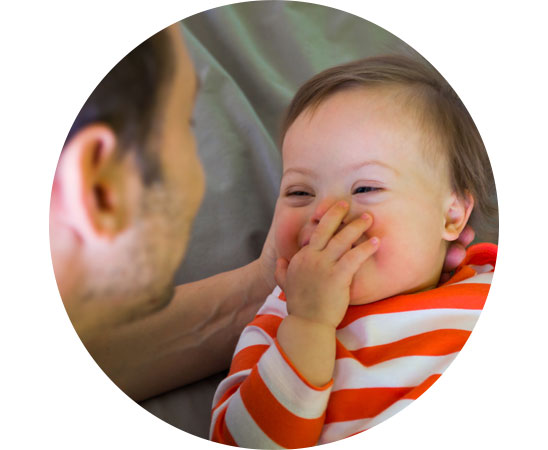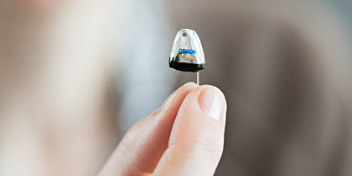Hearing loss occurs in a number of different ways and indeed is one of the most common medical conditions presented to GPs. Some types of hearing loss occur due to an injury, an illness or an accident and some people lose their hearing over time. However, it should be noted that genetic hearing loss is a common way for people to suffer from hearing loss and diminished hearing capabilities. Hearing loss which is related to genetics can be present from birth, which is referred to as congenital hearing loss, or there can be a delayed onset where a hearing loss develops over time, often many years.

Genetic hearing loss
What is Genetic hearing loss?
Genetic hearing loss can be either progressive or non-progressive. Progressive hearing loss means that the loss of hearing becomes worse or more significant over time where as in the case of non-progressive hearing loss it remains stable over time. These losses can occur in one ear or both ears. Even if hearing loss does occur in both ears, the level of hearing loss can differ between the two ears. This form of hearing loss is asymmetric hearing loss.

Forms of genetic hearing loss
It is believed that there are over 400 forms of genetic hearing loss. A vast number of these hearing loss types can be separated through the audiological characteristics, which means the type of hearing loss, the degree of severity of hearing loss or the progression of hearing loss, or through other factors including:-
– The way the hearing loss was inherited
– Vestibular characteristics
– Other physical or medical characteristics
When it comes to hearing loss as a hereditary condition, research has uncovered that around 60% to 70% comes with no other hereditary condition, which is referred to as a non-syndromic situation. This means that the remaining cases, the 30% to 40% of hereditary hearing loss come along with other organs being affected. This is called a syndromic situation where the mutation of genes has a wider impact than just hearing loss.
Genetic hearing losses have also been broken down into the following types:-
– Autosomal Dominant
– Autosomal Recessive
– X-Linked
Autosomal dominant hearing loss
In this form of hearing loss, it is an individual parent that has been responsible for carrying the dominant gene with respect to hearing loss and they likely suffer from hearing loss and in turn pass it on to their child. In these cases, there is more than a 50% likelihood that the child will suffer from a form of hearing loss. If both parents have this gene, and suffer from hearing loss, then the likelihood of the child suffering from this condition rises even higher. This is also the case when it comes to both grandparents from a singular side of the family suffering hearing loss due to genetic issues. It is fair to say that if at least one of the parents involved has a genetic hearing defect, there is a level of expectation that the child will suffer from some form of hearing loss.

Autosomal recessive hearing loss
In this form of hearing, both of the parents, who will usually have a normal level of hearing, will carry a gene that is considered to be recessive. If this is the case, there is a 25% likelihood of a child suffering from hearing loss. Due to the fact that there is no sign that either parent suffers from hearing loss, and if there is no known history of hearing loss in the family, there will be no prior expectation of hearing loss for the child. This is obviously a situation that can be harder for parents to come to terms with.
An autosomal dominant hearing loss is not any better or more comforting that an autosomal recessive hearing loss, but it can provide parents with expectations or the chance to prepare themselves for providing their child with the best support and assistance.

X-Linked hearing loss
In this form of hearing loss, it is the mother that holds the recessive trait that is responsible for the loss of hearing. This trait is found on the sex chromosome. It is possible to pass on this trait to boys and girls, but it is more likely that boys will be affected.
There are also other genetic syndromes where the loss of hearing is recognised as one of the characteristics, including:-
– Down Syndrome
– Usher Syndrome
– Treacher Collins Syndrome
– Crouzon Syndrome
– Alport Syndrome

Treatments for genetic hearing loss
Any child that is born with a genetic hearing disorder or suffers from genetic hearing loss should receive support and assistance as soon as possible. It is recommended that children begin to receive treatment before they reach six months old as this will assist the child in developing communication skills that are comparable with their peers.
There are numerous treatments available and a parent will need to focus on what is right for their child and for the family as a whole. Budgetary constraints may have an impact on some treatments but by speaking to medical practitioners and support groups, parents will be able to find the widest range of options available.
With children as young as four weeks old being able to benefit from the use of a hearing aid, this is one treatment that should be considered in treating genetic hearing loss. The use of a hearing device is ideal in amplifying sound; helping children to hear communications and this can play a vital role in developing their language skills. This style of assistance is not suitable for children that are suffering from hearing loss that is listed as severe to profound level but for many other youngsters, a behind the ear hearing aid is a safe and reliable option.
Many parents will also decide to learn and develop sign language skills in their family but this is a choice for individuals and families to make.




